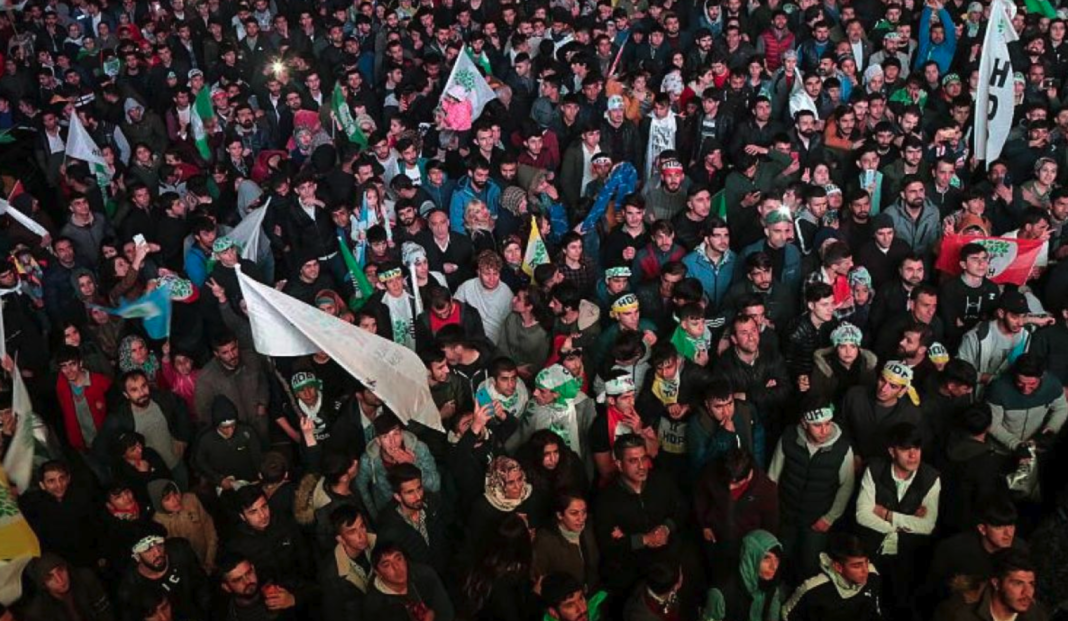By Sinan Ciddi in Foundations for Defense of Democracy on March 14, 2023.
Turkish President Recep Tayyip Erdogan has expanded the number of political parties affiliated with his “People’s Alliance” to include a far-right Islamist party: Huda Par, a religiously conservative Kurdish political party. Huda Par is an extremist entity linked to Turkish Hezbollah. While not affiliated with the Lebanese equivalent, Turkish Hezbollah retains links to Iran. It is widely perceived to be a sponsor of terrorism, and its leaders are on record for stating their belief that “Hezbollah is not a terrorist organization.”
Recently confirming presidential and parliamentary elections will be held on May 14, Erdogan has realized that his presidential reelection bid is trailing the opposition. Kemal Kilicdaroglu, the opposition Nation Alliance’s candidate for president, is apparently leading Erdogan by 10 percentage points in the polls. Furthermore, it appears as though the pro-Kurdish People’s Democracy Party, or HDP, which is not a part of the opposition alliance, will also back Kilicdaroglu’s candidacy. This is a major problem for Erdogan, as the support of Kurdish voters could land Kilicdaroglu the presidency in the first round of voting.
Erdogan is scrambling for all the support he can get.
Huda Par is the only Kurdish political party that may deliver the Erdogan camp some Kurdish votes. Still, the choice to ally with Huda Par is both a questionable and risky strategy. It’s questionable because Huda Par is in favor of implementing Shariah to replace secular order in Turkey. This is not something that the vast majority of voters in Turkey support. During the 1990s, the party was linked to the Turkish Hezbollah and hard-liners in the Turkish state. It assisted in the targeting of Kurds deemed enemies of the state.
Today, however, Huda Par is very much on the fringes of the Kurdish movement. Without the votes of mainstream Kurds, both the Erdogan and Kilicdaroglu camp will find it difficult to cross the 50% electoral threshold to win the presidency in the first round. Kilicdaroglu’s advantage is that the HDP represents the votes of mainstream Kurdish voters. The Kurdish vote helped Ekrem Imamoglu decisively win the mayor’s race for Istanbul in 2019. And without it, it is difficult to see how Erdogan can win the presidency for a third term. One strategy would be for the Constitutional Court to close down the HDP. This is certainly possible because there is a closure case pending before the court. Even if this did happen, however, the HDP’s leadership could still encourage votes for Kilicdaroglu.
The problem only grows bigger for Erdogan.
His senior coalition partner, Devlet Bahceli, leader of the Nationalist Action Party, is a well-known hater of Kurdish identity. Including Huda Par in the People’s Alliance will likely not sit well with Bahceli. For now, Bahceli is keeping his silence, but will this hold? Erdogan’s tactical move to expand his electoral partners by adopting the fringe is a sign that Turkey’s 21-year president is in panic mode. A weak economy, typified by high inflation (85% in 2022), has been compounded by a devastating series of earthquakes. Voters are skeptical that Erdogan may be the leader that can deliver them to better days. But in the increasingly unlikely event that Erdogan does win, he will be forced to reward Huda Par by giving parliamentary seats to an extremist political party that brutally killed people such as Gaffar Okkan, Diyarbakir’s police chief in 2001.
One question remains: Even though he may lose the election, does this automatically translate into Erdogan leaving power?
Sinan Ciddi is a nonresident senior fellow at the Foundation for Defense of Democracies, where he contributes to FDD’s Turkey Program and Center on Military and Political Power.
By Sinan Ciddi in Foundations for Defense of Democracy on March 14, 2023.

